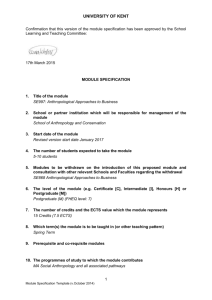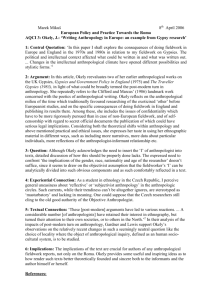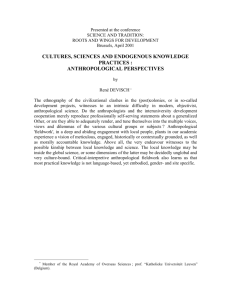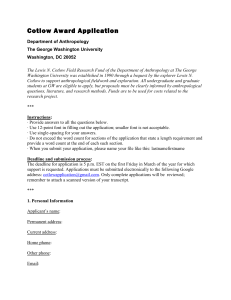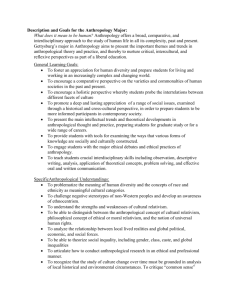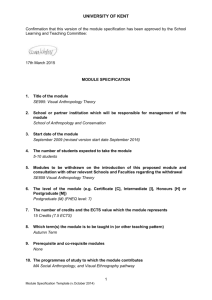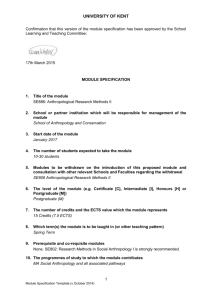UNIVERSITY OF KENT Confirmation that this version of the module
advertisement
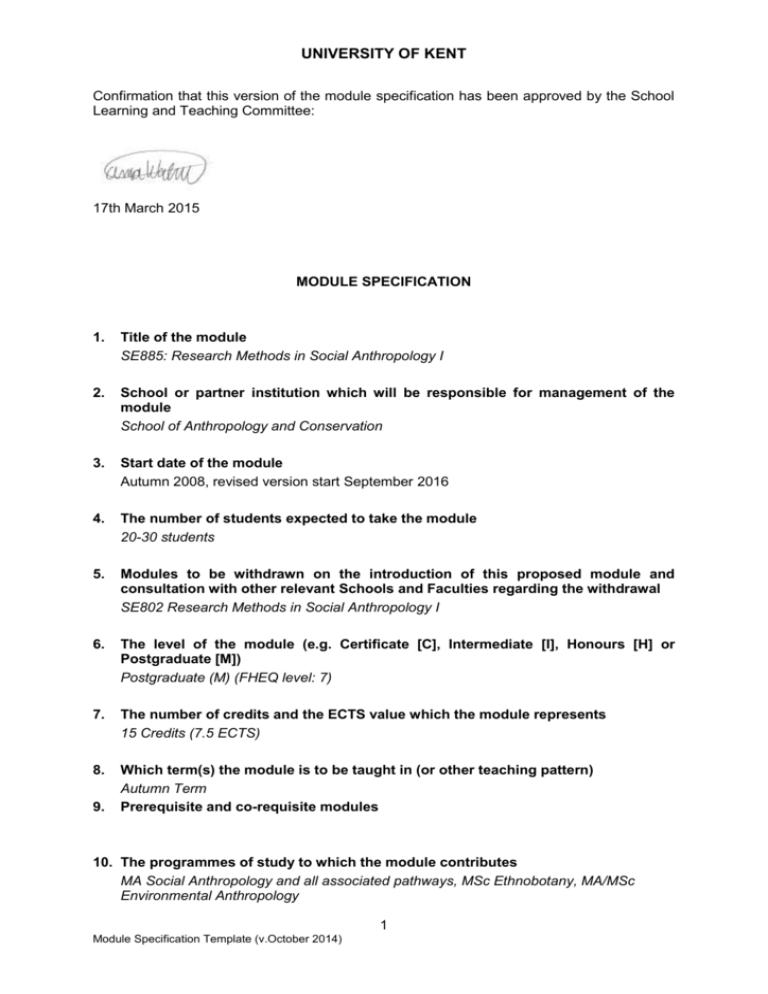
UNIVERSITY OF KENT Confirmation that this version of the module specification has been approved by the School Learning and Teaching Committee: 17th March 2015 MODULE SPECIFICATION 1. Title of the module SE885: Research Methods in Social Anthropology I 2. School or partner institution which will be responsible for management of the module School of Anthropology and Conservation 3. Start date of the module Autumn 2008, revised version start September 2016 4. The number of students expected to take the module 20-30 students 5. Modules to be withdrawn on the introduction of this proposed module and consultation with other relevant Schools and Faculties regarding the withdrawal SE802 Research Methods in Social Anthropology I 6. The level of the module (e.g. Certificate [C], Intermediate [I], Honours [H] or Postgraduate [M]) Postgraduate (M) (FHEQ level: 7) 7. The number of credits and the ECTS value which the module represents 15 Credits (7.5 ECTS) 8. Which term(s) the module is to be taught in (or other teaching pattern) Autumn Term Prerequisite and co-requisite modules 9. 10. The programmes of study to which the module contributes MA Social Anthropology and all associated pathways, MSc Ethnobotany, MA/MSc Environmental Anthropology 1 Module Specification Template (v.October 2014) UNIVERSITY OF KENT 11. The intended subject specific learning outcomes On successfully completing the module MA/MSc students will be able to: 1) examine the relationship between theory, research design and methods 2) use anthropological methods, including analysis of data collected in class exercises 3) gain an introduction to the ‘participant observation’ method and it analysis through practical experience 4) develop, conduct and analyse interviews, questionnaires, workshops and focus groups, as part of a broader anthropological project 5) explore case studies through which these tools and methods can be examined and critiqued 6) learn the basics of research design and how to write an initial research project abstract 7) appreciate the potential challenges and benefits of anthropological research in a variety of settings, including as part of applied anthropological research associated with natural science and biodiversity conservation programmes. 12. The intended generic learning outcomes On successfully completing the module MA/MSc students will be able to: 1) Acquire understanding and introductory facility in using various tools and methods within anthropology and the social sciences 2) Gain an introductory understanding of ethics within the context of fieldwork and the disciple at large 3) Present ideas systematically and cogently both orally and in writing 4) Interact with peers and their seminar leaders in the exchange of ideas 13. A synopsis of the curriculum The module will consist of twelve two hour classes consisting of short introductions to weekly topics by the course convenors followed by practical exercises to allow students to experience and learn by doing several key methods and tools used in anthropological fieldwork. Assignments based on the use of several methods, a research proposal abstract for their future dissertation project, and an essay will be used to assess the student’s achievement of learning outcomes. Seminar topics may include: Introduction to research in the natural and social sciences, participant observation, choosing informants, interviewing, processing interview data, analysis and presentation of qualitative data, questionnaire design and analysis, developing an integrated research design, running workshops and focus groups, ethics and consent. 14. Indicative Reading List Bernard, H. Bernard. 2005. Research Methods in Anthropology: Qualitative and Quantitative Approaches. Altamira Press. Greenwood, Davydd J. 2006. Introduction to Action research: Social research for Social Change. Sage Publications. Kindon, Sara, Rachel Pain, and Mike Kesby. 2007 Participatory Action Research Approaches and Methods: Connecting People, Participation and Place. Routledge. Martin, G. 2004. Ethnobotany: A Methods Manual. Reprint from 1995. Earthscan. Newing, H, Eagle, C, Puri, R and Watson, C. 2011. Conducting research in conservation: social science methods and practice. Routledge. Pelto, Pertti and Gretel H. Pelto. 1978. Anthropological Research: The Structure of Inquiry. Robben, Antonius and Jeffrey A. Sluka , eds. 2006. Ethnographic Fieldwork; an Anthropological Reader. Blackwell Books. 15. Learning and Teaching Methods, including the nature and number of contact hours and the total study hours which will be expected of students, and how these relate to achievement of the intended module learning outcomes This module will be taught be means of one 2 hour seminar for 12 weeks. Seminars will involve short introductions, class exercises, group presentations and discussions, and critical evaluation of use of methods in the seminar as well as outside class while completing assignments. Students will also be expected to devote a total of 126 hours to research, 2 Module Specification Template (v.October 2014) UNIVERSITY OF KENT reading, coursework preparation and use of online resources provided via the Virtual Learning Environment (Moodle) for this module. Total Contact Hours: 24 Independent Study Hours: 126 Total Study Hours: 150 Table of subject and generic learning outcomes supported by these methods: Teaching & Learning Method Subject Learning Outcomes Generic Learning Outcomes Seminars Independent study 11.1, 11.3, 11.4, 11.5, 11.6, 12.1, 12.2, 12.3, 12.4 11.7 11.1, 11.2, 11.3, 11.4, 11.5, 12.1, 12.2, 12.3 11.6, 11.7 16. Assessment methods and how these relate to testing achievement of the intended module learning outcomes Assessment for this module is by 100% coursework. This module will have a two thousand word essay associated with it, the topics of which will be decided between the student, his or her supervisor, and the course convenor (65%) of his or her module mark. The remainder of the mark will be made up of two assignments based on class exercises (35%) of the final module grade. Table of subject and generic learning outcomes supported by these methods: Assessment Method Subject Learning Outcomes Generic Learning Outcomes Essay 11.1, 11.5, 11.6, 11.7 12.1, 12.2, 12.3 Exercises 11.2, 11.3, 11.4 12.1, 12.2, 12.3, 12.4 17. Implications for learning resources, including staff, library, IT and space This module requires little in the way of resources other than those already available. Library and School resources, both physical and digital, are regularly reviewed and the module reading list is revised on an annual basis with extra purchases made where necessary. We have a dedicated postgraduate editing space in the School. The school's Director of Graduate Studies has responsibility for the staffing of this module. All Social Anthropology Staff have experience in research methods is the normal convenor is not available. 18. The School recognises and has embedded the expectations of current disability equality legislation, and supports students with a declared disability or special educational need in its teaching. Within this module we will make reasonable adjustments wherever necessary, including additional or substitute materials, teaching modes or assessment methods for students who have declared and discussed their learning support needs. Arrangements for students with declared disabilities will be made on an individual basis, in consultation with the University’s disability/dyslexia support service, and specialist support will be provided where needed. 19. Campus(es) or Centre(s) where module will be delivered: Canterbury 3 Module Specification Template (v.October 2014)
